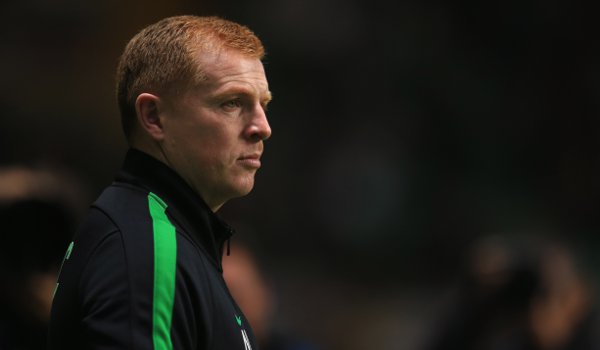COMMENT
AS Neil Lennon walked out to take in the atmosphere for what turned out to be Celtic’s last European game at Parkhead this season against Milan, his “heart sank” when he saw banners of William Wallace and IRA Hunger Striker Bobby Sands held aloft beside the words: “The terrorist or the dreamer, the savage or the brave, depends whose vote you’re trying to catch or whose face you’re trying to save.”
No one could argue with the colour, dynamic and humour the Green Brigade have brought to Celtic Park since the group emerged back in 2006 but this stunt affected the Celtic manager deeply — and the majority of supporters.
Lennon acknowledged that you could feel the “subdued” atmosphere adding that Celtic supporters are “fed up of it”. He also had this to say: “It certainly wasn’t the time or the place for a display like that.
“There’s no place for it. It should’ve been a celebration rather than people having a grumble about something.
“When I came in here, I tried to bring the club together again. I think we’ve done that, certainly with the performances over the last three of four years, so it’s disappointing to see that some people want to bring cracks in amongst the club.”
Uefa will now begin disciplinary action against Celtic.
At the previous home game against Aberdeen, fans held aloft a large ‘H’ symbol — representing the Maze Prison block where 10 Republicans died on hunger strike in 1981, including Bobby Sands.
Next to that were words from Flower of Scotland: “They fought and died for their wee bit hill and glen.”
In the aftermath SPFL chief executive Neil Doncaster said: “We are looking at that and as soon as we are in a position to comment further we’ll do so.”
There are often religious or political related banners at Celtic Park. You could argue that flags featuring Brother Walfrid are religious and that the club’s very beginning is a political happening.
Many other clubs also have songs and banners that could fall into these categories. Celtic and the support have had to fight to keep their Irish history and identity alive.
 Celtic boss Neil Lennon
Celtic boss Neil LennonBut it’s when the Green Brigade enter into the politics specifically associated with The Troubles of the 1970s and ’80s that they get Celtic into bother and alienate their fellow fans.
The image of Bobby Sands polarises Celtic fans and stirs up a variety of feelings and emotions.
Celtic supporter Terry Francis, 49, of West Lothian said: “The Bobby Sands story is one I grew up with, it’s in living memory and many Catholics in Scotland related and identified with it.
"That said, I don’t think the Green Brigade should be waving a flag with Bobby on it at the game. We’re going through a peace process, only last month people in Scotland were arrested for planning acts of terrorism in relation to dissident Irish republicanism.
"I don’t know what the motivation is for the flag but the biggest part of Celtic fans don’t want to see it at the game. I understand what the Green Brigade are trying to do but I don’t agree with it.
"With all respect to them, they’ve got this one wrong: you can’t pair up an event from 1305 and one from 1981, it doesn’t scan.”
The politics of Nationalism doesn’t feel like the right fit for Celtic, whether it’s Scottish or Irish. When the fans raise awareness of the club’s history, charitable roots or the oppressed that is something the majority of supporters and the club will get behind.
The Green Brigade have previously won the support of Neil Lennon who has publicly singled them out for praise; now he’s visibly exasperated with fans who continue to associate Celtic with the IRA.
Speaking in June, Celtic director Michael McDonald, while acknowledging the unique atmosphere they bring, said this: “There are parts I disagree with.
"Put simply we are from an Irish background and the bulk of our supporters are Roman Catholic but we are open to everyone, we don’t care what religion you are born into or how you vote in the election, we welcome everyone.
"Sometimes I feel that is a little bit lost among a more hard-core element.”
Celtic chief executive Peter Lawwell accused the ultras group of damaging the club’s reputation. He described the banners as “nothing more than clear disrespect for the club”.
The Green Brigade issued a statement in response saying: “As the number of Celtic fans banned from games continues to grow and the court cases and all additional baggage piles up, we will stand by them, we will stand with the Celtic support and as always we will defend our right to cultural and political expression.”
With neither side willing to give any ground, it looks as though this display could signal the end of the Green Brigade. In August the club announced it was to close section 111 (where they are situated) due to fan behaviour and started to relocate supporters.
After a turnaround it is unlikely Celtic will renege a second time if they are pushed.
That undoubtedly would be damaging because, when they avoid the IRA, the Green Brigade have transformed the atmosphere at Celtic Park; they have brought back long-forgotten terrace anthems and created some of the most memorable and astonishing displays in European football while bolstering season books sales for the club during a time of severe austerity.
The past eight years without them is unimaginable.
Richard Purden is the author of We Are Celtic Supporters and Faithful Through and Through

